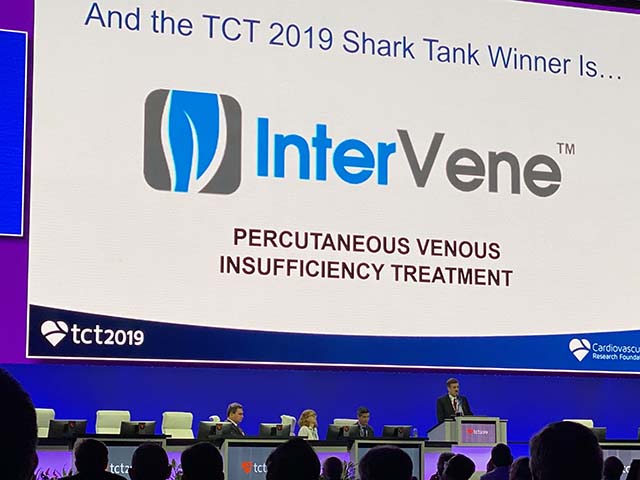
Source: CRF
At the 2019 Transcatheter Cardiovascular Therapeutics (TCT) meeting (25–29 September, San Francisco, USA), InterVene won the TCT-Shark Tank Innovation Competition for its novel endovenous system (BlueLeaf) for forming valves in patients with deep vein reflux and/or chronic venous insufficiency. The award, which is supported by the Jon DeHaan Foundation, means that the company receives $200,000 to further develop their device.
Upon receiving the award, Fletcher Wilson—InterVene’s founder and CEO—said he and his colleagues wanted to develop a new approach for managing deep vein reflux because the condition has such an effect on patients. “When the disease progresses to ulceration, quality of life deteriorates. Also, the cost impact is huge. To put it into perspective, 15 billion is spent directly on venous ulcers each year—that is one out of every $200 spent in the entire US healthcare system. Therefore, venous ulceration is a big problem,” he added.
According to Wilson, current approaches to deep vein reflux are limited with patients being “stuck with compression therapy and wound care”. Furthermore, he said, previous attempts at addressing the problem have not been successful with, for example, implants being associated with thrombosis. Therefore, InterVene sought to develop a minimally invasive method that did not require an implant and one that was “easy enough that the growing number of interventionalists focusing complex venous disease could widely use it”. Wilson commented: “Our approach is to form a valve out of the vein wall itself. Really, what we are trying to do—as much as possible—is to mimic natural physiology.” The BlueLeaf system is used with intravascular ultrasound (IVUS) and fluoroscopy guidance, is delivered via 16FR retrograde common femoral access, and is able to create multiple valves per procedure.
Wilson reported that in a feasibility study (INFINITE-OUS) of 13 patients, the procedure was successful in nearly all patients (12). Of the patients for whom seven-month data were available (10), the mean revised venous clinical severity score (rVCSS) was 4.9 and eight patients had a more than four-point improvement. He noted: “The most important thing is that we have not had any occlusive deep vein thrombosis out to seven months and even out to a year for a lot of a patients.
Outlining InterVene’s plan for “successful commercialisation”, Wilson stated that the company would seek to collect robust clinical data, show favourable health economics, and work with societies on potential inclusion in guidelines. The initial focus with the system is chronic venous insufficiency but InterVene may look to expand this indication at a future date.
Speaking about winning the TCT-Shark Tank Innovation Competition to BIBA Briefings, Wilson said: “It was honour to even be able to participate in an event like this. The panellists have been involved in such important medical innovations that have touched countless lives, so hearing their feedback and positive response was both helpful and validating. I also think this win says something more broadly about the venous interventional space in general. A peripheral venous company winning at TCT would have been very unlikely a decade ago, and I think it validates that the cardiovascular community is starting to realise how important venous is, and how many patients are out there in desperate need of better solutions. The generous award money will be put to good use supporting our US IDE Trial, continued product development, and building out and maintaining our team.”
Shark Tank competition

BlueLeaf
InterVene was one of 10 finalists who presented their technologies at a Shark Tank session prior to them being announced as the winner. Robert S Schwartz, chairman of the Jon DeHaan Foundation, stated that there was a three-step process in selecting the company as the winner: one, the judges (or “sharks”) reviewed and scored the presentations about two weeks prior to TCT; two, following the presentations, the sharks picked the top three; and three, the “sharks retreated for the final deliberations and the winner was selected from the three finalists”. He called InterVene’s technology “remarkable” and described it as “vein reconstruction utilised in the intima of the vein itself”. The other finalists in the top three were Magenta Medical and Metavention. Their technologies, respectively, were a renal vein decompression device for managing advanced decompensated heart failure and an integrated radiofrequency nerve ablation system for improving hyperglycaemia and fatty liver in patients with type 2 diabetes.
Juan Granada, president and CEO of the Cardiovascular Research Foundation (CRF; the organisers of TCT), said the CRF had “looked really hard to find the best and most impactful technologies”. He added: “We strongly believe that the TCT-Shark Tank Innovation Competition has created a global initiative to identify innovative technologies that have the potential to disrupt the diagnosis and treatment of patients with cardiovascular disease”. According to Granada, the average rate of acceptance for inclusion in the competition was 15.9%. “So, just to be in this competition is a great endorsement by the highly experienced judges”.
For anyone considering applying for future competitions, he told BIBA Briefings that they should “identify technologies that have the potential to disrupt and transform the field”. “We prefer companies that are early enough in the development process; around the first-in-human phase of development. Digital healthcare solutions are always welcomed. Addressing/explaining how the technological developments can improve healthcare inequality and access is important. Description of the management team is particularly important,” he added.
Schwartz observed that the purpose of the Jon DeHaan foundation is to encourage innovation. He said: “Jon DeHaan is a very successful business man who, early in his career, had an acute myocardial infarction. Over the intervening years since his myocardial infarction, he has benefited substantially from cardiovascular technology. Jon is a guy who does not take anything lying down and a result of his cardiovascular issues, he founded a non-profit foundation devoted to innovation in cardiology. To that extent, he is giving monetary awards to very important start-up technologies.”
This article is part of a series of BIBA Briefings columns published in Venous News. For previous columns, see past issues.












